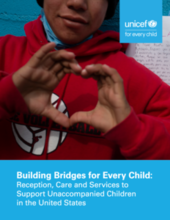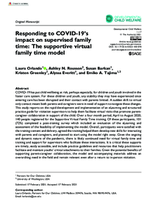Displaying 381 - 390 of 2509
UNICEF’s new report, Building Bridges for Every Child: Reception, Care and Services to Support Unaccompanied Children in the United States, considers global discussions on adequate reception and care for unaccompanied migrant and asylum-seeking children. Following the journey of children traveling alone from northern Central America to the U.S. – entering, navigating and leaving the U.S. reception and care system and transitioning to community life – this report presents eight overarching recommendations for the realization of a better and more equitable system of care and support for every child.
"The lawyers working to reunite immigrant parents and children separated [from their families] by the Trump administration reported Wednesday that they have found the parents of 105 children in the past month," according to this article from NBC News.
This article from the Conversation puts a spotlight on the situation of young people aging out of the child welfare system in Ontario, Canada during the COVID-19 pandemic.
"A so far unknown number of children have been orphaned since the virus began killing their parents -- and so many others -- last year," says this article from ABC News. "Often, the responsibility to keep the family together has been placed on the eldest siblings."
The current study aimed to identify the critical components of an efficacious dyadic relationship enhancement intervention for siblings in foster care through a secondary analysis of fidelity of implementation and trial outcome data.
The current study aimed to identify the critical components of an efficacious dyadic relationship enhancement intervention for siblings in foster care through a secondary analysis of fidelity of implementation and trial outcome data.
A migrant detention facility in the U.S. is being reactivated to hold up to 700 children ages 13 to 17, according to this article from the Washington Post.
In this video, NBC News' Isa Gutierrez spoke with a mother who is struggling to recover from the trauma brought on by the Trump administration's family separation policy as the Biden administration tries to reunite the families that have yet to be brought back together.
This study reports on the rapid development and implementation of an eLearning and structured practice guide for visitation supervisors to help them facilitate virtual visits that promote parent-caregiver collaboration in support of the child.
This article from Teen Vogue shares the stories of young people aging out of foster care in the U.S. during the COVID-19 pandemic and the impacts that has had on them.


